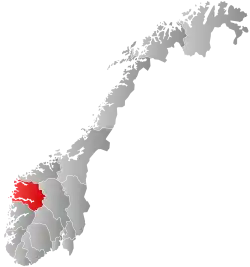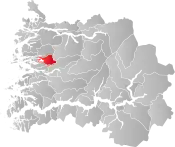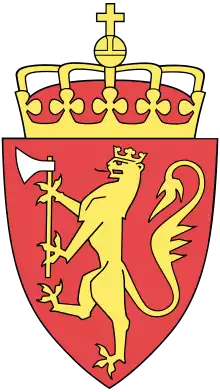Eikefjord
Eikefjord is a former municipality in the Sunnfjord district in the old Sogn og Fjordane county, Norway. The 145-square-kilometre (56 sq mi) municipality existed from 1923 until 1964 when it joined Flora Municipality (now part of Kinn Municipality in Vestland county). The administrative center of the former municipality was the village of Eikefjord, where Eikefjord Church is located. The municipality of Eikefjord was located at the end of the Eikefjorden, about 30 kilometres (19 mi) east of the town of Florø. The lake Endestadvatnet was part of the municipality. The municipality encompassed the immediate area around the village of Eikefjord and to the east and south of the village.[1]
Eikefjord herad | |
|---|---|
 View of the Eikefjorden | |
 Sogn og Fjordane within Norway | |
 Eikefjord within Sogn og Fjordane | |
| Coordinates: 61°35′04″N 05°27′29″E | |
| Country | Norway |
| County | Sogn og Fjordane |
| District | Sunnfjord |
| Established | 1 Jan 1923 |
| Disestablished | 1 Jan 1964 |
| Administrative centre | Eikefjord |
| Area | |
| • Total | 145 km2 (56 sq mi) |
| *Area at municipal dissolution. | |
| Population (1964) | |
| • Total | 919 |
| • Density | 6.3/km2 (16/sq mi) |
| Time zone | UTC+01:00 (CET) |
| • Summer (DST) | UTC+02:00 (CEST) |
| ISO 3166 code | NO-1435 |
| Preceded by | Kinn in 1923 |
| Succeeded by | Flora in 1964 |
| Website | www |
Name
The municipality was named after the old Eikefjord farm (Old Norse: Eikifjǫrðr) since the Eikefjord Church was located there. The farm is named after the nearby fjord which is located nearby. The fjord name comes from the Old Norse word eiki which means oak wood.[2]
History
The parish of Eikefjord was established as a municipality on 1 January 1923 when the large municipality of Kinn was divided into three: Kinn (population: 2,508) in the west, Bru (population: 1,560) in the centre, and Eikefjord (population: 929) in the east.
During the 1960s, there were many municipal mergers across Norway due to the work of the Schei Committee. On 1 January 1964, Eikefjord Municipality (population: 919) was merged with the town of Florø (population: 2,040), Kinn Municipality (population: 3,567), the parts of Bru Municipality located north of the Førdefjorden (population: 1,155), the Husefest and Breivik areas of Bremanger Municipality (population: 9), and the Steindal area of Vevring Municipality (population: 25) were combined to form the newly created Flora Municipality.[3]
Government
Municipal council
The municipal council (Heradsstyre) of Eikefjord was made up of 13 representatives that were elected to four year terms. The party breakdown of the final municipal council was as follows:
| Party Name (in Nynorsk) | Number of representatives | |
|---|---|---|
| Labour Party (Arbeidarpartiet) | 5 | |
| Christian Democratic Party (Kristeleg Folkeparti) | 1 | |
| Centre Party (Senterpartiet) | 3 | |
| Liberal Party (Venstre) | 3 | |
| Local List(s) (Lokale lister) | 1 | |
| Total number of members: | 13 | |
| Party Name (in Nynorsk) | Number of representatives | |
|---|---|---|
| Labour Party (Arbeidarpartiet) | 5 | |
| Liberal Party (Venstre) | 3 | |
| Joint List(s) of Non-Socialist Parties (Borgarlege Felleslister) | 5 | |
| Total number of members: | 13 | |
| Party Name (in Nynorsk) | Number of representatives | |
|---|---|---|
| Labour Party (Arbeidarpartiet) | 5 | |
| Joint list of the Farmers' Party (Bondepartiet) and the Liberal Party (Venstre) | 4 | |
| Joint List(s) of Non-Socialist Parties (Borgarlege Felleslister) | 3 | |
| Total number of members: | 12 | |
| Party Name (in Nynorsk) | Number of representatives | |
|---|---|---|
| Labour Party (Arbeidarpartiet) | 4 | |
| Liberal Party (Venstre) | 5 | |
| Joint List(s) of Non-Socialist Parties (Borgarlege Felleslister) | 3 | |
| Total number of members: | 12 | |
| Party Name (in Nynorsk) | Number of representatives | |
|---|---|---|
| Local List(s) (Lokale lister) | 12 | |
| Total number of members: | 12 | |
| Party Name (in Nynorsk) | Number of representatives | |
|---|---|---|
| Labour Party (Arbeidarpartiet) | 4 | |
| Liberal Party (Venstre) | 5 | |
| Joint List(s) of Non-Socialist Parties (Borgarlege Felleslister) | 3 | |
| Total number of members: | 12 | |
References
- Store norske leksikon. "Eikefjord – tidligere kommune" (in Norwegian). Retrieved 2013-11-08.
- Rygh, Oluf (1919). Norske gaardnavne: Nordre Bergenhus amt (in Norwegian) (12 ed.). Kristiania, Norge: W. C. Fabritius & sønners bogtrikkeri. p. 361.
- Jukvam, Dag (1999). "Historisk oversikt over endringer i kommune- og fylkesinndelingen" (PDF) (in Norwegian). Statistisk sentralbyrå. Cite journal requires
|journal=(help) - "Kommunevalgene og Ordførervalgene 1959" (PDF) (in Norwegian). Oslo: Statistisk sentralbyrå. 1960. Retrieved 2020-02-16.
- "Kommunevalgene og Ordførervalgene 1955" (PDF) (in Norwegian). Oslo: Statistisk sentralbyrå. 1957. Retrieved 2020-02-16.
- "Kommunevalgene og Ordførervalgene 1951" (PDF) (in Norwegian). Oslo: Statistisk sentralbyrå. 1952. Retrieved 2020-02-16.
- "Kommunevalgene og Ordførervalgene 1947" (PDF) (in Norwegian). Oslo: Statistisk sentralbyrå. 1948. Retrieved 2020-02-16.
- "Kommunevalgene og Ordførervalgene 1945" (PDF) (in Norwegian). Oslo: Statistisk sentralbyrå. 1947. Retrieved 2020-02-16.
- "Kommunevalgene og Ordførervalgene 1937" (PDF) (in Norwegian). Oslo: Statistisk sentralbyrå. 1938. Retrieved 2020-05-11.
External links
 Sogn og Fjordane travel guide from Wikivoyage
Sogn og Fjordane travel guide from Wikivoyage- Weather information in Eikefjord (in Norwegian)


